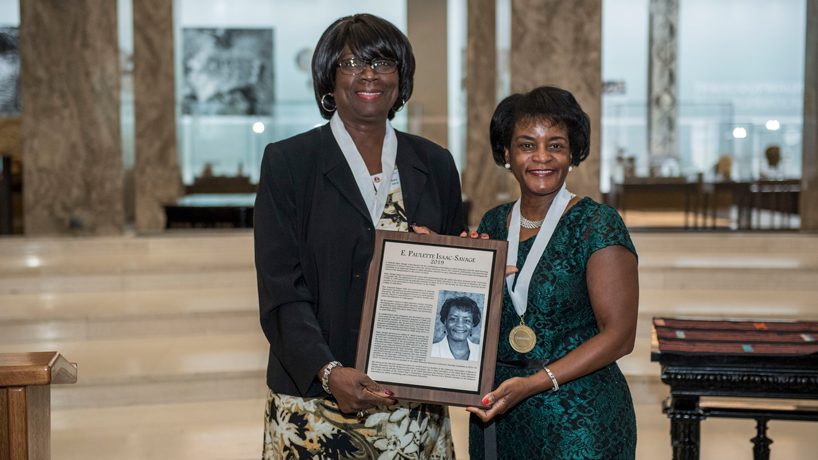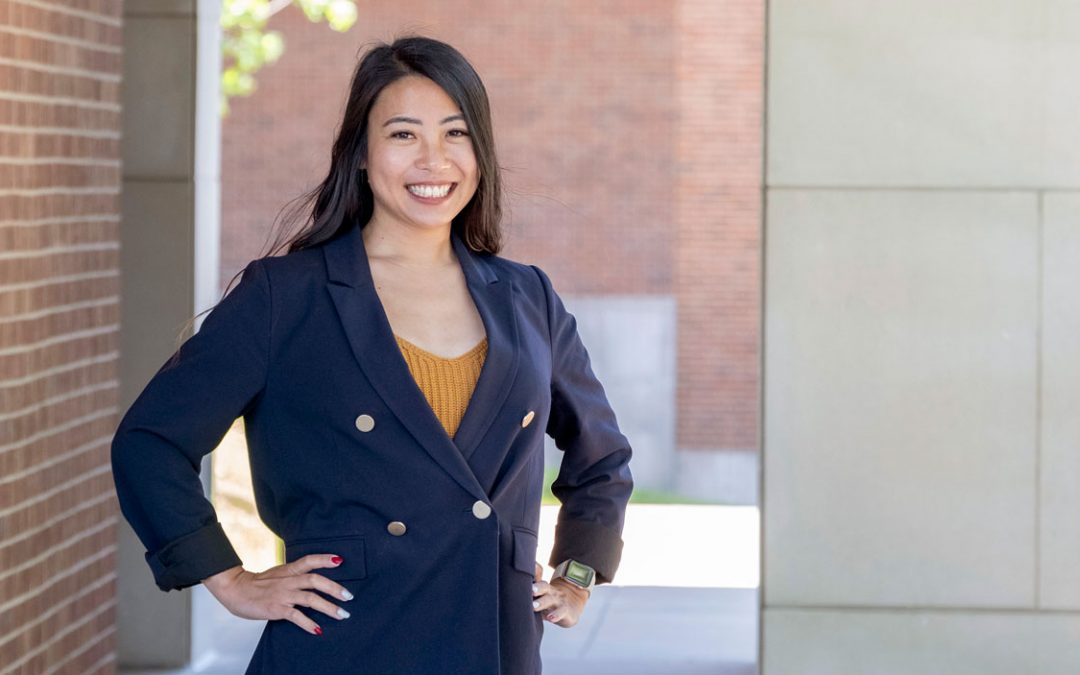
UMSL Professor of Adult Education E. Paulette Isaac-Savage (right) was inducted into the International Adult and Continuing Education Hall of Fame for her research on adult education and learning experiences of African Americans in church-based education thanks to a nomination from Mary V. Alfred, professor of adult education at Texas A&M University. (Photo by Aleksandar Letić)
As a girl, E. Paulette Isaac-Savage didn’t hang out with cousins her own age at family gatherings as one might expect. She preferred the company of older relatives – aunts, uncles and grandparents.
“I always navigated toward older people,” Isaac-Savage said. “I’ve always enjoyed being around them. Even now, I do volunteer work with Meals on Wheels where I deliver meals to older adults.”
This fondness developed into a storied career as an adult educator and pioneer in African American adult education. In recognition of her professional achievements, Isaac-Savage, a professor of adult education at the University of Missouri–St. Louis, was inducted into International Adult and Continuing Education Hall of Fame in September.
She was one of 17 inductees – and one of only three Americans – honored by the IACEHOF at a ceremony held at the National Museum in Belgrade, Serbia. The nonprofit organization was established in 1993 to recognize unique contributions of adult and continuing education scholars and practitioners and has been headquartered at the University of Oklahoma since 1996.
Isaac-Savage was shocked but grateful to be joining such esteemed colleagues.
“I was surprised and honored,” she said. “As I reflected on some of the adult educators that are in the Hall of Fame, it was just such a great honor to know I would be joining them and other adult educators that I personally know.”
While Isaac-Savage joins many notable peers, her CV is equally formidable. She is well known for her research on adult education and learning experiences of African Americans in church-based education and was one of the first adult education scholars to study the subject extensively.
Her work has focused on African American churches’ contributions to the education, health and career development of congregants. In investigating these subjects, she has also highlighted the intersections of race and social justice in adult education.
In addition to her research, Isaac-Savage has actively contributed to academic publications, serving as co-editor of Adult Learning and as an editorial board member and reviewer for other journals such as Adult Education Quarterly and Education and Urban Society. She is also an executive board member for the American Association of Adult and Continuing Education.
At UMSL, Isaac-Savage was the first African American faculty member to be promoted to full professor in the College of Education. She has worked to expand the reach of the college by developing online curriculum for the adult education program and by increasing the number of African Americans admitted to the doctoral program.
Untold stories
Isaac-Savage was a doctoral student at the University of Georgia when she first realized the African American church could be fertile ground for research. She was attending a large church in Atlanta that was extremely active in the community and provided numerous educational offerings.
“Our doors were open seven days a week,” she said. “There was something for everybody in the church, and as I was taking classes for my doctorate, I kept hearing how African Americans were not participating in adult education. I kept saying, ‘Well, something is wrong with that because I’m seeing it take place every day at my church.’”
Her expertise grew organically from that personal connection and a desire to introduce a new perspective to the field. At the time, research was primarily focused on formal adult education and on white adult learners.
“I decided that I wanted to help tell the story of African Americans and also help tell the story of the church and this important educational role as it relates to African Americans,” Isaac-Savage said.
She noted that the church has historically been the center of the African American community. It was a place where people could go for the things they were denied in everyday society – education, respect and support – often at great personal risk.
“When you think about the historical church, we had the clandestine churches, where people who were enslaved were going to learn,” Isaac-Savage said. “They were going there to worship, but they were also going there to learn, as well. So again, I just wanted to help tell that story.”
Coming back, looking forward
After finishing her dissertation on the subject and graduating with an EdD, Isaac-Savage came back to St. Louis to work at UMSL. It’s where her work as an adult educator began – albeit not in academia. Before pursuing graduate degrees in Georgia, she worked as an academic advisor on campus and volunteered as a dance instructor at the Matthews-Dickey Boys Club and as a tutor and tutor trainer for the Literacy Council of Greater St. Louis.
The offer to return was too good to pass up.
Currently, Isaac-Savage is working on a new adult education EdD in workforce development, distance learning and technology. The program is expected to begin next fall and will be geared toward a variety of people including those working with adults obtaining high school equivalencies and people working as instructional designers.
Ideally, the work the cohort does will help expand common perceptions of adult education.
“As it relates to adult education, I think that a lot of people have a misunderstanding of it,” Isaac-Savage said. “Adult education takes place everywhere, and it is defined in different ways. But one of the definitions I’d like to share with people is simply that adult education is looking at those activities that adults engage in, whereby they are gaining knowledge or skills.”
Isaac-Savage’s tireless work is worthy of recognition, but to her, helping others – whether as an educator or a volunteer – is its own reward.
“My mother was always involved in our school and community activities when I was growing up and my maternal grandmother was a caring and giving person,” she said. “I think, in a way, it’s somewhat innate for me to give back.”














